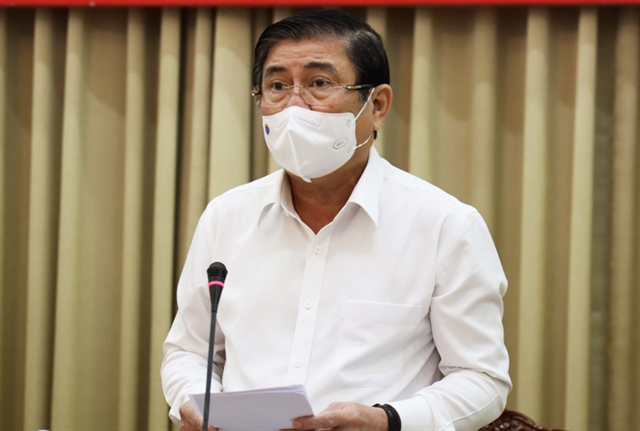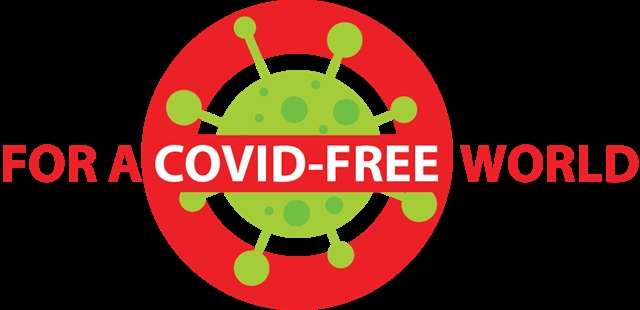 Society
Society


|
| Nguyễn Thành Phong, chairman of the city People’s Committee, speaks at an online COVID-19 prevention meeting in HCM City on Saturday morning. Photo courtesy of the HCM City Press Centre |
HCM CITY — The business community is willing to work with the Government to speed up the mass vaccination programme providing there is a policy to support them, speakers said at an online meeting on Friday in HCM City.
During the conference held by the Việt Nam Chamber of Commerce and Industry (VCCI), Đỗ Hồng Hạnh, member of the Việt Nam Textile and Apparel Association, said that some businesses were willing to connect with suppliers of COVID-19 vaccines to ensure optimal conditions for supply.
“A policy, however, is needed for the private sector to participate in the drive in order to speed up the process in general,” she noted.
For example, a company could negotiate with suppliers to bring vaccines to the airport for quality testing before payment, or could even negotiate for the transfer of vaccine production technology, she said.
Đỗ Thị Thúy Hương, vice president of the Supporting Industry Association, said: “The principle of the policy is that the State and the Ministry of Health would approve and manage vaccine quality and provide vaccinations for workers.”
The electronics and supporting industries face a risk of disruption in the supply chain as the fourth wave of COVID has hit the “industrial capital” of the northern provinces of Bắc Giang and Bắc Ninh.
She urged the government to allow companies to pay for vaccinations for their own staff.
“The business community should be able to inoculate their workforce in order to reduce the burden on the state budget as part of the effort to accelerate the government’s vaccination drive,” she said.
Most business leaders (in the electronics, textiles, footwear, wood and dairy sectors) said they were willing to join hands with the Government to find vaccine sources and pay for vaccination costs for workers.
Vũ Đức Giang, chairman of the Vietnam Textile and Apparel Association, said that businesses in the industry, which has more than 3 million workers, were “impatiently waiting for vaccinations for workers.”
The garment industry has a number of FDI enterprises that have good connections with the governments of the EU and the US, which could facilitate the import of vaccines, according to Giang.
Vũ Tú Thành, regional deputy executive director of the US-ASEAN Business Council, said the FDI business community in Việt Nam, especially pharmaceutical companies that make COVID-19 vaccines from the US and Europe, could help speed up negotiations on purchases of the vaccine.
Private sector plays a role
Referring to Indonesia’s model, Cao Hoàng Nam, director of foreign affairs and communications at PepsiCo VN, said Indonesia has a policy for businesses to contribute costs to vaccinate workers and their families.
The Indonesian health ministry has appointed certain agencies to import vaccines. Local chambers of commerce and associations send them a list of vaccination data based on which businesses register to buy vaccines for workers, according to Nam.
The vaccines must meet WTO regulations or be approved by the Indonesian health ministry, he said.
Ngô Sỹ Hoài, vice president and general secretary of the Vietnam Timber and Forest Products Association, said the private sector, especially FDI businesses, played a major role in not only funding for vaccinations but speeding up the vaccination drive.
Huỳnh Thị Mỹ, general secretary of the Việt Nam Plastics Association, said that VCCI and business associations should work together to advise the Government and the Ministry of Health on the policy.
Trần Quang Trung, chairman of the Vietnam Dairy Association, recommended that VCCI meet with the Ministry of Health and the Government to discuss the issue more closely.
The government has set a goal to vaccinate 75 per cent of the population in order to maintain international trade and investment which is critical to economic growth.
Alain Cany, chairman of EuroCham, said: “Việt Nam has been one of the world leaders in preventing the spread of COVID-19. Swift border closures, strict quarantine measures, and targeted local lockdowns have kept infections low and enabled domestic business activities to resume.”
“However, this is not a permanent solution, and it cannot continue for much longer without damaging economic growth. While Việt Nam’s borders are closed, other countries are rolling out vaccinations and re-opening their doors to the world.”
He warned there would be now a real risk that the country could fall behind unless it implements its own mass vaccination programme at scale and pace.
“The private sector, including foreign enterprises, can help speed up the country’s vaccination efforts. Our companies can provide both world-leading equipment and international expertise essential to a successful mass vaccination programme.”
Việt Nam expects to receive 31 million COVID-19 vaccine doses developed by US firm Pfizer in the second half of the year, according to the Ministry of Health.
Việt Nam began its vaccination drive on March 8, using the AstraZeneca vaccine from the UK. More than one million shots as of May 18 had been given to frontline medical workers and members of community-based anti-COVID-19 groups.
Four Vietnamese-made vaccines are under development.
Mass testing
Health authorities in HCM City collected samples from 50,000 residents in Gò Vấp District for COVID-19 testing from Friday night until early Saturday morning, after five pooled samples associated with the Revival Ekklesia Mission, a Christian congregation based in Gò Vấp District, from the same ward tested positive.
Pool testing combines samples from several individuals and conducts one single test to save time. If the result is positive, then each individual sample is tested.
The cluster at the Revival Ekklesia Mission includes 34 of its members and 24 others who came into contact with them. “Mass testing is now the most important tool to control the outbreak,” according to city authorities.
Nguyễn Thành Phong, chairman of the city People’s Committee, warned that several patients at the religious mission worked in industrial zones, so the risk of spreading to industrial zones was high.
According to the ministry, genetic sequencing of some of the cases in the new cluster showed they had the highly transmissible Indian B.1.617.2 variant.
The city government has ordered the temporary closure of hair salons and suspension of all religious events and ceremonies. Religious establishments must not gather more than 10 people.
In a related issue, Việt Nam has just recorded a completely new strain of the coronavirus in the country. The new virus strain, a hybrid between the Indian and British strains, has a fast spreading rate and strong airborne spread, according to Minister of Health Nguyễn Thanh Long.
“The Ministry of Health will announce this strain on the world gene map,” Long said.
A total of 63 infections that can be traced back to the religious group had been found as of Saturday morning, according to the HCM City Centre for Disease Control.
Thirty-two of the patients are the mission’s followers, while the remaining were their direct contacts.— VNS

|




